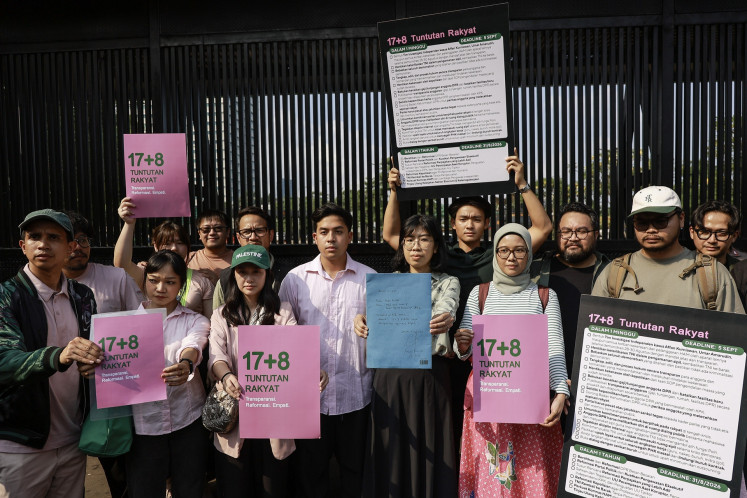Popular Reads
Top Results
Can't find what you're looking for?
View all search resultsPopular Reads
Top Results
Can't find what you're looking for?
View all search resultsFans race against scalpers for tickets
A woman is seen asking about tickets for an event in the 29th Southeast Asian Games at the Malaysian International Trade and Exhibition Center (MITEC) in Kuala Lumpur on Monday
Change text size
Gift Premium Articles
to Anyone
A
span class="caption">A woman is seen asking about tickets for an event in the 29th Southeast Asian Games at the Malaysian International Trade and Exhibition Center (MITEC) in Kuala Lumpur on Monday.(JP/Seto Wardhana)
On a sunny Saturday afternoon, 30-year-old Adi (not his real name) was busy scalping his last two tickets for Indonesia’s match against host nation Malaysia at the Kuala Lumpur Southeast Asian Games men’s soccer semifinals.
“This is your only chance [to enter the stadium]. There are no more tickets available,” Adi said to a fellow Indonesian, who had been desperate to enter Shah Alam Stadium in Selangor, the venue of the match.
Tickets for the match were sold out in less than 24 hours after it became official that Malaysia would meet archival Indonesia in the semifinals round.
Despite a request from the Indonesia Soccer Association (PSSI) for a bigger quota, the organizing committee was firm in selling 10,000 tickets to away fans — out of some 79,000 available passes sold at the 80,372-capacity stadium, leaving thousands of Indonesians struggling to get in.
The heated and tense rivalry between the neighboring countries had opened up the opportunity for ulat tiket (scalpers) to make a huge profit.
Adi sold his ticket for 80 ringgit (US$18.78), four times higher than its original price.
Originally from Jember in East Java, he has been living and working in Malaysia for more than five years. He knew nothing could stop fans from supporting their teams, particularly in a big match, even when they had to dig deeper into their pockets.
“Once the tickets were available for sale, I immediately bought dozens,” he told The Jakarta Post, adding that he was assisted by two friends in buying the tickets, both from online platforms as well as directly from the ticket gate at the stadium.
He refused to reveal how much money he has earned and claimed that he was not a frequent dealer in the business.
“In the past, there were ulat who sold fake tickets,” he said, adding that the development of barcode technology had put an end to the activity.
A member of the official ticketing crew, who wished to be called Sukri, offered the Post entrance to the stadium without checking our tickets — in exchange for 20 ringgit.
Suryanti Ali, 23, an Indonesian supporter who works and resides in Klang and attended the match with two friends, said that she had struggled to get tickets before a scalper approached her.
“I found out last night that tickets were no longer available, but I still came here because I wanted to watch [Indonesia] play. I don’t mind paying a scalper,” she said, adding that it took more than an hour’s drive for her to arrive at the stadium.
Latief Usman, 40, born and raised in Lamongan, East Java, traveled all the way from Petaling to Kuala Lumpur after learning that the tickets had been sold out and the Indonesian Embassy in Malaysia (KBRI) would provide 3,000 free tickets for Indonesians
“It was not easy. We arrived at 9 a.m. and had to jostle in the queue. They [embassy officials] told us that the tickets had run out. Luckily after waiting, they gave us our tickets at 2 p.m.,” said Latief, who went with six friends.
The match, which drew one of the biggest crowds in SEA Games history, ended with a victory for the host team. The stadium, which provided an electrifying atmosphere throughout the 90 minutes, exploded when Malaysian forward N. Thanabalan scored with a header four minutes before the time.
The committee aired the match on a large screen outside the stadium to accommodate the thousands of Indonesians who did not get tickets.










